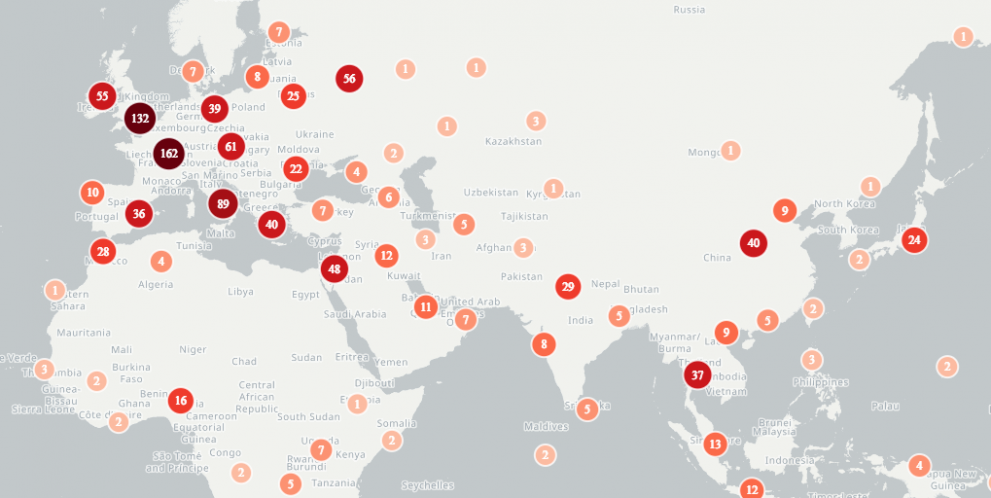
This media surveillance collects articles reported through publicly available web sites.
It is created with the Europe Media Monitor (EMM).
The selection and placement of stories are determined automatically by a computer program.
Headlines
- UK government confirms second strain of coronavirus first identified and bans travel from South Africa
- South African Covid-19 variant may be 'more effective at spreading'
- US: more than 1 million people have been vaccinated in the US while case numbers continue to rise; President Trump rejected bipartisan stimulus package
- India: active cases continue to drop amid threat of UK mutant strain
- Brazil: Butantan institute says vaccine from China’s Sinovac has efficacy above 50%, but delays full results again
- Spain’s incidence rate exceeds ‘extreme risk’ level
- France reopened UK border to truckers with negative Covid test
- Italy: families of Italian Covid-19 victims seek 120 EUR million from government
- Germany: the number of new cases remains at a high level with 32195 new cases and 802 deaths
- Belgium found four cases of UK strain 'early December'
- Luxembourg plans first vaccinations for 28 December
- Sweden: the Swedish national response continues to be an outlier with cases and deaths increasing more rapidly than in its Nordic neighbours
- Israel will impose a third national lockdown to fight climbing cases on Sunday for two weeks
- Russia counted 29,900 new cases on Thursday, the highest daily spike
- Antarctica: 36 confirmed cases were reported from Chilean Bernardo O'Higgins research stationNew Zealand reported seven new cases in managed isolation
- Taiwan’s EVA Air fired New Zealand pilot blamed for Covid-19 case
- South Korea secured vaccine deals as new restrictions take effect
- Japan: Tokyo reported record high 888 new cases on Thursday
The following news were found among the most mentioned/retweeted items:
- "Mutant coronavirus in the United Kingdom sets off alarms, but its importance remains unclear" (science, also: nytimes, bbc)
- "Preliminary genomic characterisation of an emergent SARS-CoV-2 lineage in the UK defined by a novel set of spike mutations" (virology)
- "Biden team's multibillion-dollar school testing plan takes shape. The proposal under consideration calls for the federal government to cover the cost of providing tests to K-12 schools throughout the country." (politico)
- "No ‘negative’ news: how China censored the coronavirus. Thousands of internal directives and reports reveal how Chinese officials stage-managed what appeared online in the early days of the outbreak." (nytimes)
- "L.A. County outlines wrenching moves to ration healthcare if COVID-19 hospital crisis worsens" (latimes)
- "Mexico misled citizens about the severity of coronavirus in its capital. The federal government had data that should have prompted an immediate lockdown in early December. Instead, it kept the city open for another two weeks." (nytimes)
The most mentioned English sources were the New York Times, Fox News, Breitbart and Reuters.
El País, RT (Spanish Version) and Infobae, and Le Monde and Le Parisien were among the most mentioned Spanish and French sources, respectively.
Fact Check
- Fact checkers debunk claims that coronavirus tests are unreliable given that Coca-Cola tests positive for coronavirus. Fact checkers report that antigen tests are designed to analyse human fluids and should not be used to analyse other substances with different acidity or alkalinity (efe).
- Fact checkers address a selectively edited news clip that has been widely shared in anti-vax social media pages to suggest the COVID-19 vaccine is unsafe. The clip shows a nurse fainting after she gets the vaccine, but - fact checkers note - it does not show her quick recovery afterward when she explains that she is prone to fainting when triggered by the slightest pain (factcheck.org).
- Fact checkers address an image circulating on Facebook and Twitter claiming to show three of four clinical trial volunteers who have developed Bell's palsy after receiving doses of the Pfizer vaccine. Fact checkers report that while a US FDA document states that four participants developed Bell's palsy during the trials, investigators found "no clear basis upon which to conclude a causal relationship" between the vaccine and the condition (afpfactcheck).
- Fact checkers debunk a video in which a man, who identifies himself as Muslim, tries to dissuade people from taking the Pfizer vaccine because it is “not halal”, reporting that, according to experts, the vaccine does not have any nonhalal ingredients in it (newsweek).
- Fact checkers debunk claims that COVID-19 vaccines contain “toxic” ingredients that make them more dangerous than COVID-19 itself, reporting that while the vaccines may cause mild or moderate short-term reactions, these resolve without complication (politifact).
- Fact checkers debunk claims that cold-storage COVID-19 vaccines are aimed at genetic manipulation (aap).
Download PDF
Contact
Mail to JRC-EMM-SUPPORT ec [dot] europa [dot] eu (subject: COVID-19%20media%20surveillance) (JRC-EMM-SUPPORT[at]ec[dot]europa[dot]eu)
ec [dot] europa [dot] eu (subject: COVID-19%20media%20surveillance) (JRC-EMM-SUPPORT[at]ec[dot]europa[dot]eu)
Related Content
Details
- Publication date
- 24 December 2020
